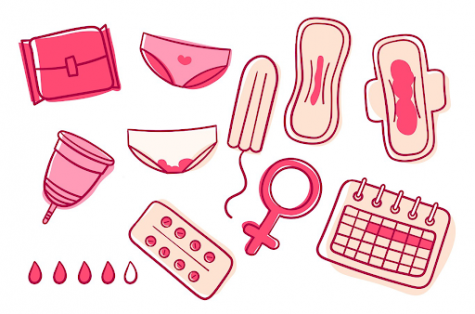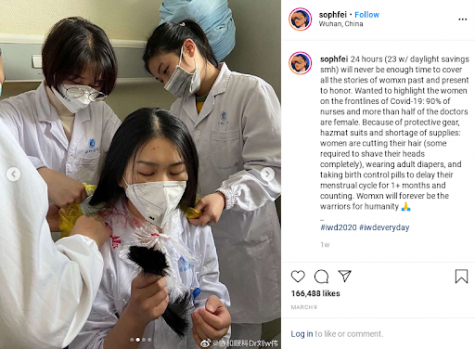Talking Periods… and not the Grammatical Kind

Menstruation products and feminist symbols art (Medium.com)
Period poverty is not an uncommon phrase within the feminist community, but where it’s not so typical is modern-day society. Around the world, there are more than 800 million people who menstruate daily. It’s often stigmatized and deemed an unnecessary concern in today’s world.
Women around the globe world use menstrual products such as pads and tampons. There are 35 states who have a “Tampon Tax” on their menstruation products, a tax that defines these products as luxury products. Pads and tampons are not luxuries; they are necessities.
“They’re as necessary as toilet paper,” said Julissa Ferreras-Copeland in a New York City Council meeting where she convinced the council to make New York City the first in the U.S. to provide feminine hygiene products free of charge to women in public schools, prisons, and homeless shelters.
Menstrual products should be treated as health necessities, and people should support policies put in place to protect those who menstruate. Menstruators around the world depend on free products from schools, work, and public facilities if they’re unable to provide for themselves. There are not a lot of facilities offering these products, which is unfair to people who cannot afford them even though they’re necessary for them to use (to avoid leaking, infections, etc.).

“Periods are…” Google Search (By Maya Lyou)
When searching “periods are…” on Google, three phrases stigmatizing periods are used, including the very first result; “periods are gross,” “periods are not natural,” and “periods are disgusting.”
The stigma surrounding periods is astonishing. Periods are completely natural, yet society shames them and defines them as “disgusting” or “horrifying.” Young girls should not think that they are unable to discuss their periods with anyone and that their period is something to be ashamed of. Children should be taught that periods are part of the beautiful cycle of life, not a monstrous issue.
“In Nepal, for example, menstruating women are seen as impure by their community and banished to huts during their cycles. While menstrual huts are technically illegal, families continue taking the risk because myths and misconceptions are deeply rooted in Nepalese culture,” said Global Citizen.
Many girls stay home from school when on their period because of pain, lack of products, or to avoid bullying. When this is repeated, girls lose the opportunity to participate in many activities, including losing part of their education. Girls also tend to hide their pads or their tampons in their pockets or sleeve when heading to the bathroom because they’re embarrassed. They’ve been taught that it’s an embarrassment to have a period, something that over half the world’s population experiences.
It all starts when children are first educated on puberty. Oftentimes, schools provide puberty courses at the end of elementary school, but with a separate course for girls, and that’s where the stigma begins. It’s understandable: boys are not going to experience periods, so why should they be taught it? If boys were always educated on periods and taught that periods are normal, a big chunk of society would not be shaming periods or make uneducated claims about them.
Currently, a pandemic has swept the globe, and it could be hitting women a little harder than men.
“Periods don’t stop for pandemics,” said Dana Marlowe, founder of “I Support Girls,” an organization that donates bras and period products to people experiencing homelessness.
As hysteria hits the grocery stores, people clear out shelves of food and supplies, along with menstrual products like pads and tampons. People who rely on free products from schools, work, and public facilities are now at a bigger disadvantage than ever before. Even when a world-wide issue occurs, women seem to get the worse side of it. It’s also very scary for pregnant women, or women with newborns staying in hospitals filled with sick patients and a deathly virus.

International Women’s Day Instagram post with photos of doctors and nurses in Wuhan, China cutting/shaving their hair (By Sophia Li)
As a praise to women on International Women’s Day, Sophia Li, a New Yorker journalist shared photos of women in Wuhan, China shaving and cutting their hair. In order to decrease their chances of contracting the virus, women are cutting or shaving their hair because long hair will get in the way of their hazmat suits or leave their hair more exposed and more likely to contract the virus. Li explains in her caption that there is a shortage of supplies, meaning that if women need to use the bathroom to change a pad or tampon, they have to put on a brand new suit, which is not available. She mentions that nurses and doctors are using adult diapers to avoid taking off the hazmat suit, but women have to deal with their periods which becomes a complication. Many women have begun to take birth control pills so that their period is delayed and they no longer have to use extra supplies or not attend work for a week.
Periods are completely natural and should be normalized, period products should be free and considered a healthy necessity, and periods should be considered when dealing with many situations (missing school, working in hazmat suits all day, etc.). Periods are NORMAL.